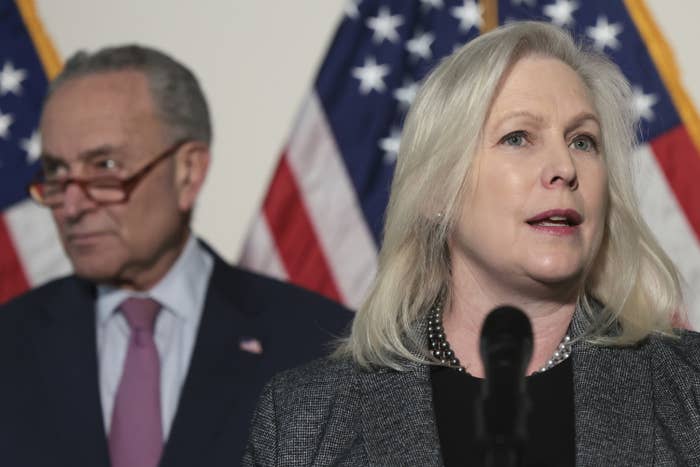
A #MeToo era bill that will change how private companies handle sexual harassment and assault is headed to President Joe Biden’s desk after easily passing the Senate on Thursday.
The bill will end the use of a secretive legal process known as forced arbitration, which prevents many people from bringing sexual misconduct claims to court. It was first introduced in 2017 at the height of the #MeToo movement by Sens. Kirsten Gillibrand, a New York Democrat, and Lindsey Graham, a South Carolina Republican.
Historically, forced arbitration has protected abuse and harassment perpetrators, as the process keeps claims out of the public and offers no structure for appeals, often silencing people who are harmed — but it’s a common requirement of many employment contracts. The legislation marks a significant change to employment law by giving people the option of suing in state, tribal, or federal courts and retroactively invalidating contracts that eliminated the possibility of doing so.
Ahead of the Senate vote, Gillibrand said in a statement that the legislation was “one of the most significant workplace reforms in American history” and attributed its passage now — four years after it was first introduced — to Democrats being in the majority.
But the bill has significant and rare bipartisan support. It passed the Senate on Thursday by voice vote, meaning the chamber skipped the long process of each member voting individually, a sign of how uncontroversial the legislation has become. The bill passed the House of Representatives in a similar fashion earlier this week by a 335–97 vote.
“For far too long, Americans who experience sexual harassment or assault in the workplace have been forced into the shadows, compelled to sign secretive arbitration agreements that protect their employers from liability and often shield offenders from accountability,” House Speaker Nancy Pelosi said in a statement following the bill’s passage. “Employers prevail over their workers in more than 98 percent of these cases — and by 2024, an estimated 80 percent of private-sector workers will be forced into these unfair agreements.”
Moments of significant bipartisan agreement in Congress have been few and far between since Biden took office last year, and most pieces of major legislation have stalled due in large part to the 60-vote filibuster threshold to move most legislation through the Senate, which is currently split 50-50.
“There’s a lot of publicity about sexual harassment and about people not getting justice through the present process,” Sen. Chuck Grassley, an Iowa Republican, told Politico ahead of the vote. “I’m quite an arbitration supporter, but in this particular instance, I think that it’s easy to cover up sexual harassment, sexual assault. … And women’s issues are a hot issue right now too, and ought to be.”
The issue has attracted Republican support in part due to the advocacy of former Fox News host Gretchen Carlson, who filed a lawsuit against former Fox News chair Roger Ailes in 2016.
“We would have sued Fox News instead of only suing Roger Ailes,” Carlson told the New York Times about how forced arbitration affected her case. “I did not understand the ramifications of that clause. Tons of people have no idea they have the clauses.”
The bill has narrowed since it was first introduced, however, in part to attract Republican support, including focusing specifically on sexual assault and harassment, rather than other employment issues, including discrimination.
But some supporters, including Sen. Elizabeth Warren, hope it’s a first step toward eliminating mandatory arbitration across the board.
“I have wanted to get rid of mandatory arbitration and all consumer contracts for well over a decade,” she told Politico. “We’re getting action right now because it’s focused on sexual assault, but make no mistake: Mandatory arbitration is a way for giant corporations to squeeze consumers and make sure that they don’t have access to the courts, to exercise their legal rights.”

